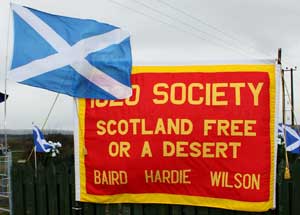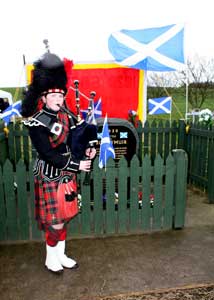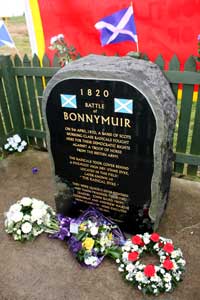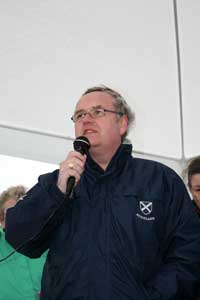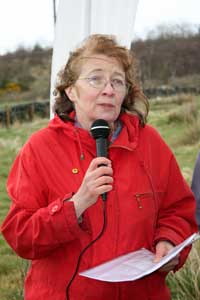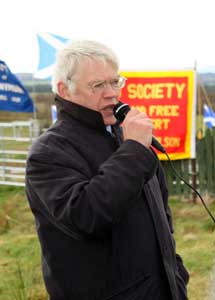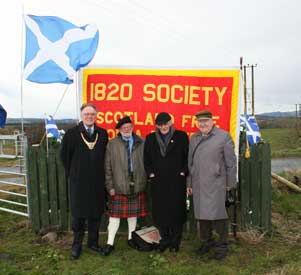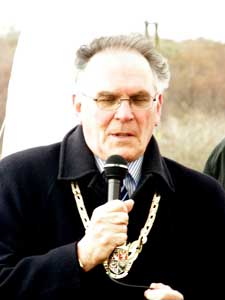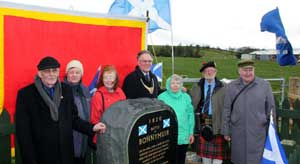The 1820 Society
Battle of Bonnymuir Remembered
Inclement weather conditions did not deter the crowd that gathered near Bonnymuir on 4th of April, to commemorate an incident in what is regarded as the most significant episode in the history of 19th century Scotland, namely the Scottish Insurrection.
The ‘Battle of Bonnymuir’ took place on 5th April 1820 when a band of Scottish Radicals on their way to take over the Carron Ironworks, were confronted by British military forces in a field which is marked today by a memorial on the roadside to the East of the St. Andrew’s Works, on the B816 road. Having taken their position behind an old dyke, the Radicals allowed the cavalry to come within thirty yards of them, when they fired a volley. The cavalry instantly charged, firing a few shots when going over the dyke. The Radicals received the charge with their pikes, and made all the resistance in their power, but they soon found themselves in a bad situation and throwing away their arms, endeavoured to escape, when the cavalry captured nineteen prisoners. In September, the men were tried for treason with three executed and 19 others sent to penal colonies at Botany Bay in Australia.
After the laying of wreaths at the monument from Falkirk District Council, the 1820 Society, and Camelon Local History Group, followed by a minute’s silence and the playing of a lament by the piper, Amy Lowe, those assembled were addressed by several guest speakers.
Provost Pat Reid, Labour leader of Falkirk District Council, spoke of the profound influence that the French and American revolutions had on the Scottish working class. The provost described the serf like working conditions of the time and the determination of the Radicals who enjoyed popular support, to challenge tyrannical employers and corrupt officials in pursuit of decent wages and the right to vote. He suggested that the commemoration was an opportunity for those present to undertake a self–evaluation to see if they could measure up to the gallant ideals of the patriots of 1820.
Councillor David Alexander, Opposition SNP Group Leader, spoke of the cultural imperialism of the 18th century which involved attempts to erase the name of Scotland from the map in favour of North Britain, and spoke of the need to forge a strong sense of Scottish identity which is egalitarian and internationalist in character. He linked the ideals of the Radicals to the continuing struggles in Scotland for social justice, democratic rights and political independence.
The Chairperson then called on Mary McCabe of the 1820 Society to read the poem Dark Bonnymuir, which was reputedly written within days of the battle.
The final speaker was Ian Scott, a local historian and former National Convener of the Saltire Society, who in a well–researched talk, described the significance of the 1820 Rising for subsequent working class struggles including the granting of universal suffrage. He ended by saying of the Radicals, “We salute their bravery and courage. As long as there is a place called Scotland we shall remember these men”.
The Chairperson, Ian Bayne on behalf of the 1820 Society, thanked people for attending, especially the speakers and Camelon Local History Group for looking after the monument. Following the financial appeal and a collection, the event was drawn to a close with the singing of A Man’s A Man for a’ That.
ENDS
1820 Society Website: |

